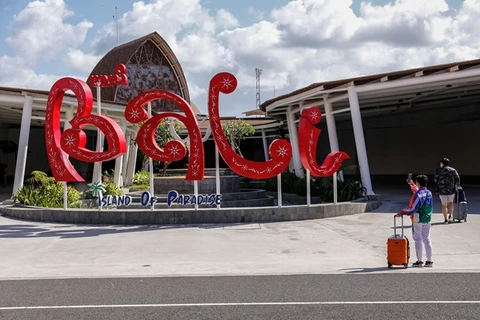Jakarta (VNA) – Coordinating Minister for Economic Affairs Minister Airlangga Hartarto has said that the Indonesian Government was preparing a roadmap towards a “new normal” era to be applied when the nation achieves herd immunity against COVID-19.
The main prerequisites are that herd immunity must first be achieved, vaccination must be ramped up to 2.5 million doses per day, and the daily number of new infections is less than five thousand, Hartarto noted in a statement here on October 7.
Indonesia's COVID-19 response strategy, which underscores upstream and downstream handling, has proven to be yielding good results, as mirrored in the value of the Reproduction Number (Rt) of 0.60.
This figure is relatively lower than the global Rt and that of other countries, according to him.
Singapore's figure is 1.44; the UK, 0.97; the world, 0.92; America, 0.9; India, 0.86; the Philippines, 0.85; and Malaysia, 0.81. Hence, Indonesia is one of the best in handling COVID-19, the minister said.
Indonesia's economic growth is inversely proportional to the COVID-19 case count. In the second quarter, when the number of COVID-19 cases were below 100,000, economic growth jumped to 7.07 percent. However, when the Delta variant prevailed, COVID-19 cases jumped by 573,000 and economic growth was estimated to decline to around 3.5 to 4 percent.
In this fourth quarter, the Indonesian economy is expected to grow some 5 percent, as several indicators have improved considerably and COVID-19 cases have been sloping, he noted.
Hartarto added that the government's policy on enforcing people's activity restrictions (PPKM), increased testing and tracing, and accelerating vaccinations have succeeded in cutting the number of active COVID-19 cases by 94.59 percent, from the peak on July 24, and by 53.81 percent in the last two weeks.
The World Bank has lauded the speed of implementing vaccination in Indonesia that has reached more than 100 million doses. Through this achievement, Indonesia is ranked fifth in the world in terms of the number of injections of the first dose and stood sixth globally for the total number of COVID-19 vaccination jabs./.
The main prerequisites are that herd immunity must first be achieved, vaccination must be ramped up to 2.5 million doses per day, and the daily number of new infections is less than five thousand, Hartarto noted in a statement here on October 7.
Indonesia's COVID-19 response strategy, which underscores upstream and downstream handling, has proven to be yielding good results, as mirrored in the value of the Reproduction Number (Rt) of 0.60.
This figure is relatively lower than the global Rt and that of other countries, according to him.
Singapore's figure is 1.44; the UK, 0.97; the world, 0.92; America, 0.9; India, 0.86; the Philippines, 0.85; and Malaysia, 0.81. Hence, Indonesia is one of the best in handling COVID-19, the minister said.
Indonesia's economic growth is inversely proportional to the COVID-19 case count. In the second quarter, when the number of COVID-19 cases were below 100,000, economic growth jumped to 7.07 percent. However, when the Delta variant prevailed, COVID-19 cases jumped by 573,000 and economic growth was estimated to decline to around 3.5 to 4 percent.
In this fourth quarter, the Indonesian economy is expected to grow some 5 percent, as several indicators have improved considerably and COVID-19 cases have been sloping, he noted.
Hartarto added that the government's policy on enforcing people's activity restrictions (PPKM), increased testing and tracing, and accelerating vaccinations have succeeded in cutting the number of active COVID-19 cases by 94.59 percent, from the peak on July 24, and by 53.81 percent in the last two weeks.
The World Bank has lauded the speed of implementing vaccination in Indonesia that has reached more than 100 million doses. Through this achievement, Indonesia is ranked fifth in the world in terms of the number of injections of the first dose and stood sixth globally for the total number of COVID-19 vaccination jabs./.
VNA
























